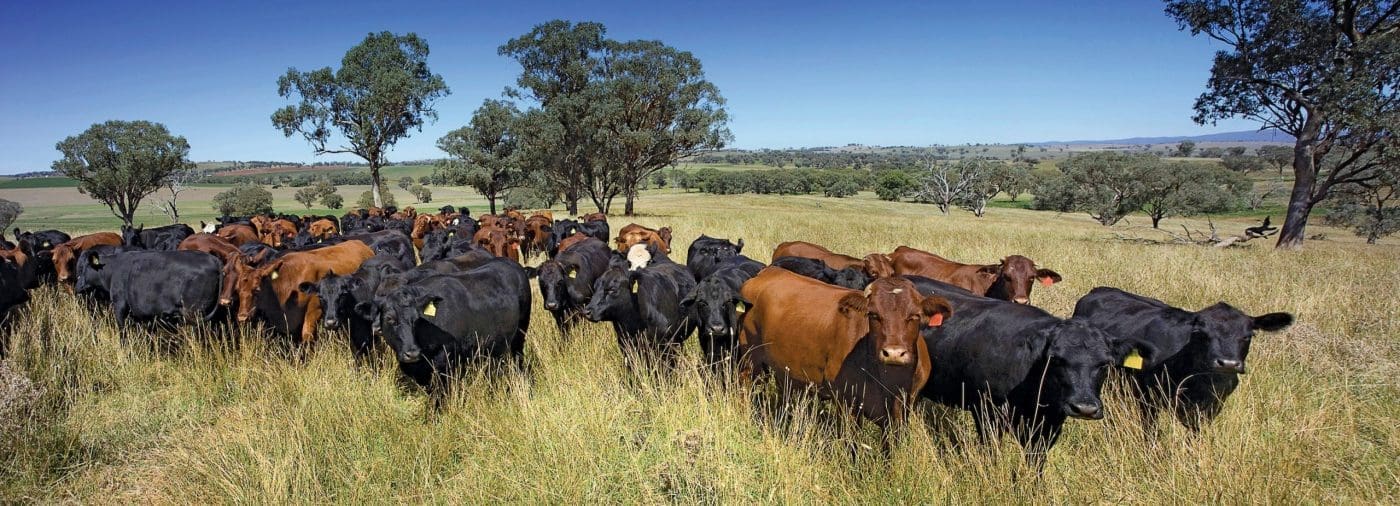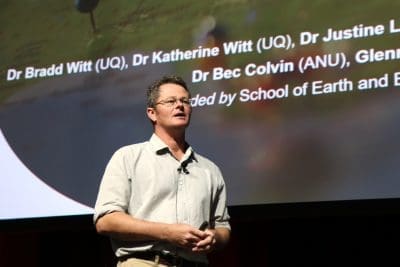
Red and black Cattle, Orange N.S.W. Australia known as the color city, situated in central west N.S.W. Famous for apples, grapes, cherries,
WHAT consumers and the broader public really think about cattle production and in particular its environmental performance has become one of the most discussed and debated industry issues over the past decade.
But, apart from traditional and social media coverage of key events and conflicts, to date there has been limited peer reviewed research on what drives public perceptions of the environmental performance of and trust in the Australian cattle industry.
Research led by The University of Queensland and published last week in the journal Environmental Research Letters has developed the first model of public attitudes towards the Australian cattle industry.
In a nutshell the research has found that public trust in the Australian cattle industry is high, but does not translate to support for a relaxed regulatory environment.
The study concludes that the industry should remain ‘open and transparent about its operations’ and ‘actively communicate with the general public about its values and goals in terms of shared sustainability objectives’.
Research involved a national online survey in 2018 of 2913 participants, selected to be representative of the Australian public by age, gender and geography, and ensuring both urban and regional attitudes were accounted for.

Lead resercher Dr Bradd Witt from the School of Earth and Environmental Science at The University of Queensland, speaking at the 2019 NTCA conference in Darwin. Dr Witt said he hopes the research assists constructive discussions within the industry, but also with those with a genuine interest in the sustainability of the industry.
Participant attitudes were measured on a range of factors including their perception that the Australian cattle industry manages environmental risks, can the Australian cattle industry be relied on provide reliable and accurate information, whether the Australian public has a right to influence how cattle farmers manage the environment, whether there needs to be strong environmental regulations of cattle farmers and whether are too many environmental regulations.
The researchers set out with a hypothesis suggesting that public trust in the industry is important because if the industry is not perceived to be trustworthy, this will increase the public’s desire for an external party to monitor and regulate the industry’s behaviour, to ensure minimum standards are upheld.
However, the authors reported that through their research they discovered relationships between public attitudes toward the Australian cattle industry that departed from the expected model.
They found that their hypothesised path from trust to need for environmental regulation was not significant.
Instead it was revealed that high trust does not reduce public expectations for environmental regulation, aside from a small indirect effect.
Second, while attitudes toward the environmental performance of the industry are partially influenced by one’s environmental orientation, this orientation is particularly important in predicting the public’s perceived need for environmental regulation.
The paper says a prominent narrative endures in the Australian cattle industry that regulatory measures can be relaxed in high trust environments, and that regulations should be tightened when ‘something goes wrong’.
“However, simply because people trust the industry does not mean their expectations around being informed, involved and having a voice in how the industry operates are in any way diminished,” the authors write.
“Critically, the industry should remain open and transparent about their operations and actively engage with the general public to communicate their values and goals in terms of shared sustainability objectives.”
The paper said the research found that on average respondents trusted the industry and had favourable perceptions of its environmental performance.
This indicated that the Australian cattle industry had an opportunity to use environmental regulation and societal oversight to demonstrate good environmental performance and to engage with majority urban public on a diverse range of community expectations.
Among respondents self-reported knowledge of the cattle industry was variable but generally quite low, with 57pc saying they had limited or very limited knowledge.
Self-reported knowledge of environmental issues was much higher, with only 21pc of participants rating themselves as having limited or very limited knowledge.
The authors say the Australian cattle industry needs to demonstrate responsiveness to drivers of public attitudes – and responsiveness needs to go beyond improving industry practices to increasing engagement and communication between the industry, consumers, community and other stakeholders.
“Effective communication which underpins constructive industry-society relationships informs both industry practice and public understandings of the industry while insulating against reactive policy that may have perverse environmental outcomes, not to mention wider social, economic, and animal welfare outcomes.”
It also adds that most public and media interest in the environmental performance of the cattle industry occurs when ‘things going wrong’ which highlights public outrage and provides a skewed lens of community sentiment towards the industry.
“Our study provides representative and informative insights into public attitudes and their underlying drivers which can inform more effective policy and practice for shared sustainability outcomes.”
The research was funded by the School of Earth and Environmental Sciences, The University of Queensland and CSIRO’s Responsible Innovation Future Science Platform.
The paper is titled How environmental values influence trust and beliefs about societal oversight and need for regulation of the Australian cattle industry and can be viewed at this open access link

It is easy to have an opinion when you have zero responsibility.
I would prefer instead to look at actions. For example, airlines have emission offsets that for extra money you can offset the emissions of your flight. Without going into whether the offsets are real or not, the reality is when push comes to shove few people will spend their own money to “protect” or “save” the environment. Rather they want others to do it for free. Solar panels on roof tops is another example. How many people did that when there was no money to be made? They are now heavily subsidised by society in general and the owner seeks profit from them but never pays the true cost.
This is where politicians come into the picture. Real politicians would stand up against people who have a bambi style view of the world and point out some real world realities that all of us who live in first world countries actively destroy the environment and exploit people simply through the act of expecting the standard of living we have. The solution is moving back to an agrarian cottage style existence. You can be sure not too many people when reality sets in want that despite the romanticism that some might have with that lifestyle.
Then we have the hanger’s on who seek to profit from exploiting the people with the bambi world view. They would tell the beef industry it needs to do this that and the other and of course there is a fee involved and a regulatory framework set up that cannot be enforced, but it does not have to be enforced as it exists therefore it is then used to fool the bambi people to thinking everything is wonderful. While the reality is quite different.
While people who destroy the environment need to be stamped out, everyone has a different definition of destroy.